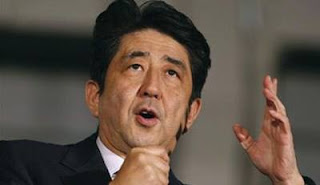An unprecedented move to rescue Africa from the tenacious grip of underdevelopment, Japan has announced a 3.2 trillion yen ($32 billion) assistance package for Africa as part of its commitment to put the continent on the path of growth.
Unveiling the package in an address delivered on Saturday at the opening session of the Fifth Tokyo International Conference on African Development (TICAD V), held at the Pacifico Yokohama Conference Centre, the Prime Minister of Japan, Mr. Shinzo Abe, said,"Over the next five years, Japan will support African growth through public and private means of 3.2 trillion yen (approximately $32 billion), including ODA of around 1.4 trillion yen and other public and private resources of around 16 billion dollars."
In his address titled, "The Africa that Joins in Partnership with Japan is Brighter Still," Abe also said Japan would would underwrite a maximum of $2 billion of trade insurance.
The package unveiled by Abe included boosting economic growth (private sector development, trade and investment, natural resources); accelerating infrastructure and capacity development (infrastructure, human resource development, science and technology, tourism); empowering farmers as mainstream economic actors (agriculture, food and nutrition security); promoting sustainable and resilient growth (environment, climate change, disaster prevention); and creating an inclusive society for growth (education and gender, health, water and sanitation).
On infrastructure, a 650 billion yen (approximately $6.5 billion) infrastructure investment over the next five years, which he said would be allocated to developing the infrastructure that "Africa itself deems necessary and plans itself."
He said the infracstructure investment would focus on expediting the development of international corridors that link inland areas with the coasts, and power grids.
Announcing the Africa Business Education (ABE) Initiative for the youth as part of human resource development, Abe said Japan would help Africa foster 30 thousand "business-savvy individuals".
Under this initiative, he said: "We will offer undergraduate and graduate education to young people from Africa who come to study in Japan, and in addition we will simultaneously provide opportunities to work as interns at Japanese companies. This will be at a scale of 1,000 students over five years."
"Together with the ABE Initiative, over the next five years, we will set about cultivating "business and industry savvy human capacities" that will lead to employment for 30 thousand individuals, making use of the human resources development already being implemented by JICA and by HIDA".
Expressing optimism that Africa’s promising young people would soon play the leading roles in businesses that connect Japan and the continent, he said it was necessary to cultivate human resources that truly match labour market demand, adding that haphazardly enhancing vocational training would not lead to jobs.
While advocating for what he called "education with an exit," the Japanese leader said his country would aim at fostering the human resources needed by companies in the local areas, particularly Japanese companies.
He said Japan would also construct hubs for human resource development at 10 locations in the field in Africa and send experts in vocational training to these hubs.
In the area of health, he said he would like to advance universal health coverage as part of Japan’s diplomatic strategy through a true public-private partnership.
"In Japan we have built up a system in which anyone can readily visit a hospital even for minor health concerns. I would like to utilize Japan’s system and experiences in Africa. We will promote health care that everyone can access - in other words, "universal health coverage," or "UHC," he said.
In the area of peace and stability, he said Japan Self-Defence Forces were already making strenuous efforts in Djibouti to assist with anti-piracy efforts and in South Sudan to assist with nation-building.
The Japanese leader also canvassed for what it called "a true partnership with Africa" that involves "thinking together and working together" adding that Japan and Africa had gone beyond being "good partners" to being more like "co-managers."
"We are colleagues and at the same time co-workers. We grow together through our mutual interactions, and through this we have become partners that will bring growth to the world", he said.
Noting that the future of Africa was bright, Abe said the future of Africa that joins in partnership with Japan would be brighter.
Meanwhile, Vice President Namadi Sambo, who led Nigerian delegation to the TICAD conference in Yakohama, will today hold a bilateral meeting with Prime Minister Abe.
THISDAY gathered that Sambo would seek Japan's support for Nigeria's bid to achieve stable power supply and agricultural development among other issues during the bilateral talks between both leaders.
TICAD, an initiative of Japan, is the largest policy dialogue on Africa outside the African continent and it is co-organized by Japan, African Union Commission, United Nations, World Bank, and the United Nations Development Programme.
TICAD V, which kicked off on Saturday, has 39 African heads of states and governments, and several development partners in attendance.
Source :#ThisDay

No comments:
Post a Comment